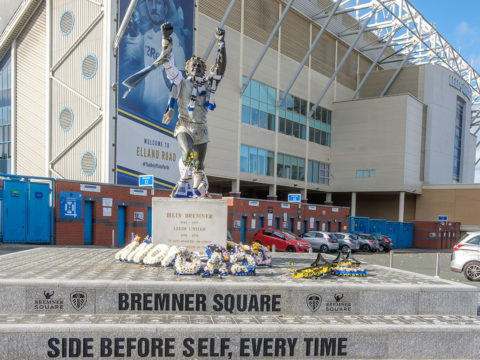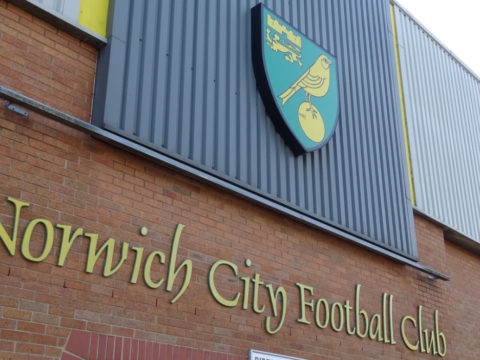The Mighty Whites – Yorkshire’s Proudest, Most Controversial, and Most Compelling Football Club
If you’re looking for a football club that embodies everything that’s dramatic, controversial, and utterly compelling about the beautiful game, Leeds United is your team. Based at the imposing Elland Road stadium in West Yorkshire, Leeds United have somehow managed to be simultaneously one of England’s most successful clubs and one of its most hated, often at the same time. They’ve won league titles, graced European finals, suffered a spectacular financial collapse, and spent more time in the wilderness than Moses – yet somehow they always manage to drag themselves back to relevance.
Currently back in the Premier League after winning the 2024-25 Championship title under Daniel Farke, Leeds United represent everything authentic about English football. They’re the club that gave us “Dirty Leeds,” inspired a generation of managers, and proved that sometimes the most beautiful failures can become the most meaningful successes. This being Leeds United, they’ve done it all the hard way, with maximum drama and minimum fuss from a fanbase that’s seen everything twice.
Formation and Early History: Rising from the Ashes
The story of Leeds United begins not with hope, but with scandal. In 1919, their predecessors, Leeds City, were forcibly disbanded by the Football League in response to allegations of illegal payments to players during the First World War. Picture the scene: a team mid-season, suddenly expelled from the league, their players auctioned off to the highest bidders at the Metropole Hotel in Leeds like cattle at market.
But this being Leeds, adversity became opportunity. On the very same day as the auction, around 1,000 Leeds City fans gathered at a public meeting at the Salem Chapel. Chaired by a local solicitor, Alf Masser, the meeting voted unanimously to form a new professional football club. They named it Leeds United.
The newly formed football club continued to play its home games at Elland Road and first competed in the Midland League before being elected to the Football League in 1920. Leeds United and Chelsea, who were elected to the league two years later, share the distinction of being the only clubs to join the league before playing a competitive fixture – though at least Leeds had the excuse of their predecessors being disbanded.
From the beginning, Leeds United carried the burden of expectation and the weight of history. The club adopted an all-white kit in 1963 under Don Revie, modelling themselves on Real Madrid in hopes of capturing some of that Spanish magic. It was a statement of intent that would define their approach for generations: aim high, expect glory, and don’t apologise for either.
The Don Revie Era: Dirty Leeds and Beautiful Football
No discussion of Leeds United can begin anywhere other than with Donald George Revie, the man who transformed a struggling Second Division club into one of the most successful and controversial teams in English football history. When Revie took over as player-manager in 1961, Leeds were in such dire straits that they nearly fell into the Third Division. By the time he left in 1974, they were one of the most feared teams in Europe.
Revie’s Leeds were revolutionary in their approach to the game. He introduced detailed dossiers on opponents, meticulous preparation, and a level of professionalism that was decades ahead of its time. His players trained harder, prepared better, and knew more about their opponents than any team in England. It was Revie who pioneered the modern management style with his detail-oriented approach and belief in dispassionate, cold analysis.
But it was the style of play that earned Leeds their notoriety. The combative nature of his teams earned United the moniker of “dirty Leeds”, as key player Eddie Gray admitted that “it was brutal stuff and, definitely win-at-all-costs”. In 1963, Leeds were labelled by the Football Association’s own FA News as “the dirtiest [team] in the Football League”.
The reputation was both earned and exaggerated. George Best said that he “hated playing against them” and that the only time he needed to wear shin pads was when he was playing against Leeds. On more than one occasion, referees had to order Leeds players off the pitch for a break mid-match to break up mass brawls. The 1964 “Battle of Goodison Park” against Everton was so violent that the referee walked off the pitch due to the carnage.
Yet beneath the reputation for ruthlessness lay genuine quality. Revie’s side won the First Division in 1968-69 and 1973-74, the FA Cup in 1972, the League Cup in 1968, and the Inter-Cities Fairs Cup twice. They finished runners-up in the league five times, reached three FA Cup finals, and came agonizingly close to European glory, losing the 1975 European Cup final to Bayern Munich in a match many Leeds fans still believe they were robbed of.
The legacy of Revie’s Leeds remains complex. They were loved by their fans, reviled by everyone else, and respected by all. In a survey of leading football writers, historians and academics by Total Sport magazine, Revie’s Leeds United were voted as one of the 50 greatest football teams of all time. Not bad for a team everyone claims to hate.
The Financial Collapse: From Barcelona to League One
If the Revie era was Leeds United’s golden age, the early 2000s represented their most catastrophic fall from grace. Under chairman Peter Ridsdale, Leeds gambled their future on Champions League qualification and lost spectacularly, creating a cautionary tale that entered football folklore as “doing a Leeds.”
The collapse began with ambition. After reaching the Champions League semi-finals in 2001 – where they took on Barcelona and Real Madrid and weren’t found wanting, Ridsdale took out a £60 million loan against future gate receipts to fund transfers. The plan was simple: qualify for the Champions League consistently, use the revenue to repay the loans, and establish Leeds as a European power.
The execution was anything but simple. Leeds spent like oligarchs on players like Rio Ferdinand (£18 million), Robbie Keane, and Robbie Fowler, while Ridsdale’s infamous quote summed up the mentality: “Should we have spent so heavily in the past? Probably not, but we lived the dream, we enjoyed the dream.”
The dream quickly became a nightmare. When Leeds failed to qualify for the Champions League in successive seasons, the financial house of cards collapsed. By the time Ridsdale stepped down in March 2003, Leeds were £103 million in debt. The fire sale began immediately: Ferdinand to Manchester United, Woodgate to Newcastle, and a succession of other stars sold for cut-price fees.
Relegation from the Premier League followed in 2004 – the first time in the club’s history they’d been relegated from the top flight. Three years later, they were relegated again, this time to League One, the first time in their history they’d played in the third tier of English football. The concept of ‘doing a Leeds’ entered football parlance as a result – a shorthand phrase for the suffering caused by chaotic mismanagement and living beyond your means.
The Marcelo Bielsa Renaissance: BielsaBall and the Beautiful Return
After years of mediocrity, false dawns, and relegation battles, Leeds United found salvation in the most unlikely of places: an eccentric Argentine coach who was considered past his prime by many observers. When Marcelo Bielsa was appointed in June 2018, few outside Leeds expected anything more than another brief attempt at promotion.
What followed was nothing short of a revolution. From his first match – a 3-1 demolition of newly-relegated Stoke City – Bielsa transformed not just Leeds United’s style of play but their entire identity. His intense, high-pressing, attacking football became known as “BielsaBall,” and it was unlike anything the Championship had seen.
Bielsa’s methods were obsessive, meticulous, and utterly compelling. He sent his players to pick up litter at the training ground to understand how many hours the average fan had to work to afford a ticket. He watched youth team games, learned about the city’s history, and created detailed dossiers on every opponent. When caught spying on Derby County’s training session, he responded with a legendary press conference that laid out his entire tactical philosophy. All this while making bucket seats fashionable!
The results were immediate and dramatic. Leeds topped the Championship for most of the 2018-19 season before suffering a heartbreaking collapse in the final weeks, missing out on automatic promotion and losing in the playoffs. The pain was excruciating, but Bielsa’s decision to stay for another season changed everything.
In 2019-20, Leeds finally achieved what had eluded them for 16 years: promotion to the Premier League. They didn’t just go up – they did it in style, winning the Championship title with 93 points and playing the most entertaining football in the division. On 17 July 2020, after sixteen years out of the Premier League, Leeds were promoted back to the top flight.
Their return to the Premier League was equally dramatic. A 4-3 defeat to Liverpool at Anfield on the opening day announced that Leeds were back and playing football nobody else dared attempt. They finished ninth in their first season back – the highest points tally by a newly promoted side in the Premier League since the 2000/01 campaign.
Fun Facts About Leeds United
Every football club has its quirks, and Leeds United has accumulated more than most during its turbulent history:
The Unique Kit: Leeds United is the only professional football club in England to wear claret and amber. This distinctive colour scheme, inherited from Manningham FC, has remained unchanged since 1903, making them instantly recognisable anywhere in the world.
The Real Madrid Connection: When Don Revie changed Leeds’ kit to all-white in 1963, he was deliberately copying Real Madrid, hoping to inspire his players to similar heights. The psychological impact was immediate – Leeds won promotion to the First Division the following season.
The Spygate Scandal: Bielsa’s 2019 admission that he had spied on Derby County’s training session became one of football’s most memorable press conferences. His meticulous breakdown of Derby’s tactics turned a potential scandal into a masterclass in football preparation.
The European Adventures: Leeds are one of only a handful of English clubs to have reached finals in all three major European competitions – the European Cup, Cup Winners’ Cup, and the Fairs or UEFA Cup (now Europa League).
The Elland Road Fortress: Their home ground has been Elland Road since 1919, making it one of the most historically significant stadiums in English football. The ground has hosted World Cup matches and remains one of the most atmospheric venues in the country.
The Longest Serving Home: Leeds United have only ever used one stadium as their home ground – Elland Road – where they have played since their foundation in 1919. This makes them one of the most geographically stable clubs in English football.
The Wilderness Years: From Premier League to League One
Following their relegation in 2004, Leeds United entered what can only be described as the darkest period in their history. The club that had graced European semi-finals found themselves fighting for survival in League One, struggling with financial chaos and ownership instability.
The period from 2004 to 2020 was characterised by a revolving door of managers, owners, and playing staff. After three seasons in the Championship, Leeds hit rock bottom, with relegation to League One resulting in administration and the very existence of the club coming under threat. The club were relegated from League One at the end of the season with a 15-point deduction.
They would remain in League One for three seasons – an eternity for a club of Leeds’ stature. The sight of legends like Manchester United and Liverpool playing at grounds like Hartlepool and Yeovil was a stark reminder of how far the mighty had fallen. Yet the fans remained loyal, travelling in numbers that dwarfed most Premier League clubs and creating an atmosphere that opposition players still talk about today.
The slow climb back began under various managers, each promising to be the one to restore Leeds to their former glory. There were false dawns, playoff failures, and crushing disappointments. The club seemed cursed, destined to remain in the football wilderness forever.
The Daniel Farke Era: Back Where They Belong
After Bielsa’s departure in February 2022, Leeds suffered relegation from the Premier League and found themselves back in the Championship. The appointment of Daniel Farke in July 2023 was met with cautious optimism – the German had won the Championship twice with Norwich City, but his Premier League record was less impressive.
What followed was a masterclass in second-tier management. Farke’s Leeds played a possession-based style that was both effective and entertaining, gradually building momentum throughout the 2023-24 season. When they missed out on promotion in the playoffs, it felt like another classic Leeds disappointment.
But Farke’s second season was different. Leeds dominated the Championship from start to finish, playing football that was both beautiful and ruthless. They finished the 2024-25 season with 100 points – the first time in their history they’d reached the century mark – and won the title with games to spare.
The statistics were staggering: Leeds scored 66 goals and conceded just 19, registered the best defensive record in their history, and finished with a goal difference of +47. Daniel Farke became the first Leeds manager to achieve consecutive 90-point league seasons and joined an exclusive club of managers to deliver a league title to Elland Road.
What Makes Leeds United Special
Leeds United aren’t just a football club – they’re a force of nature. Their fans are among the most passionate in English football, travelling in numbers that shames clubs with twice their resources. The atmosphere at Elland Road is legendary, with the Kop end creating a wall of sound that can be heard throughout Yorkshire (well for several streets past the ground).
The club’s identity is built on authenticity, passion, and an unwavering belief that they belong at the top of English football. They’ve never forgotten their roots, never lost their edge, and never stopped believing that better days were ahead. This sense of destiny, combined with their controversial history, makes them one of the most compelling clubs in world football.
Leeds United matter because they represent everything that’s real about football. They’re proof that passion can overcome adversity, that identity matters more than money, and that sometimes the most beautiful stories are the ones that take the longest to tell.
The Rivalries: Everyone Hates Leeds
Leeds United’s main rivals are widely considered to be Manchester United, a rivalry that stems from the historic animosity between Yorkshire and Lancashire. This was intensified during the 1960s and 1970s when both clubs were at their peak. The rivalry has been described as one of the fiercest in world football, with Alex Ferguson once calling Elland Road ‘hostile’ and ‘frightening’.
But Leeds’ talent for making enemies extends far beyond Manchester. Their secondary rivals include Chelsea (stemming from the 1970 FA Cup Final), Millwall (geography and mutual dislike), and pretty much every other club in England. The old saying “We All Hate Leeds” exists for a reason – they’ve cultivated a reputation for being difficult, uncompromising, and utterly unrepentant about it.
This universal dislike is both a burden and a badge of honour. Leeds fans embrace the hatred, understanding that being hated is often a sign of being relevant. In a world of sanitised, corporate football, Leeds remain gloriously, authentically themselves.
Notable Figures and Cultural Impact
Leeds United’s history is populated with larger-than-life characters who have shaped both the club and the wider football world. Don Revie influenced an entire generation of managers, including those who played under him, like Billy Bremner and Norman Hunter, who went on to manage and coach.
The club’s cultural impact extends far beyond football. The phrase “doing a Leeds” entered the English language as a warning about financial recklessness. Their story has inspired books, documentaries, and countless articles about the perils of ambition unchecked by reality.
More recently, Marcelo Bielsa became a cult figure not just at Leeds but throughout world football. His influence can be seen in the tactical approaches of managers across the globe, and his time at Leeds is remembered as one of the most transformative periods in the club’s history.
Modern Day Leeds United
Today’s Leeds United are a club reborn. Under Daniel Farke, they’ve rediscovered their identity while adding modern professionalism and tactical sophistication. The return to the Premier League in 2025 feels different from their previous promotions – more sustainable, more thoughtful, more built to last.
The club’s recent history has been about finding the right balance between ambition and stability. They’ve learned from the mistakes of the Ridsdale era while maintaining the passion and intensity that makes them unique. The appointment of Farke and the commitment to a long-term vision suggest that Leeds have finally found a sustainable path forward.
The fanbase remains as passionate as ever, with Elland Road continuing to be one of the most atmospheric stadiums in English football. The club’s identity, forged through triumph and disaster, remains intact. They’re still Leeds United – proud, controversial, and utterly compelling. We dare any fan not to feel a small flush of pride when the famous Marching on Together chant breaks out!
By the Numbers: The Leeds United Story in Statistics
Stadium and Attendance Records
- Current Ground: Elland Road (since 1919), capacity 37,645
- Record attendance: 57,892 v Sunderland, FA Cup fifth round replay, 15 March 1967
- Highest League Game Attendance 56,796 vs Arsenal, 27 December 1932
- Leeds consistently have among the highest attendances in their respective divisions, even during their lower league years – getting a ticket is not easy!
Major Achievements
- First Division/Premier League titles: 3 (1968-69, 1973-74, 1991-92)
- FA Cup: 1 (1972)
- League Cup: 1 (1968)
- Inter-Cities Fairs Cup: 2 (1968, 1971)
- Other Championship titles: 4 (1963-64, 1989-90, 2019-20, 2024-25)
Record Performances
- Highest league finish: 1st Division One, 1968-69, 1973-74 1991-92
- European Cup final: 1975 (controversially lost to Bayern Munich)
- European Cup Winners’ Cup final: 1973 (ultra controversially lost to AC Milan)
- Most points in a season: 100 (2024-25 Championship)
Financial Records
- Record transfer fee paid: £18 million (Rio Ferdinand, 2000)
- Record transfer fee received: £30 million (Rio Ferdinand to Manchester United, 2002)
- Maximum debt: £103 million (2003)
Managerial Records
- Most successful manager: Don Revie (1961-1974)
- Most recent title winner: Daniel Farke (2024-25)
- most loved manager (arguably) Marcelo Bielsa (2018-2022)
- Most controversial appointment: Brian Clough (44 days, 1974)
The Don Revie Era Statistics
- Seasons in charge: 13
- Major trophies: 7
- League titles: 2
- Runners-up finishes: 5
- European finals: 3
These numbers tell the story of a club that has experienced the highest highs and lowest lows in English football. From European finals to League One relegation, from £100 million debt to Championship titles, Leeds United’s statistics reflect a journey that’s been anything but ordinary.
The recent achievement of 100 points in the Championship represents not just numerical success but symbolic redemption – proof that this storied club can still reach the heights they’ve always believed they deserved.
The Enduring Legacy
Leeds United’s story is ultimately about resilience, identity, and the refusal to be ordinary. They’ve survived financial collapse, relegation, and the kind of setbacks that would have destroyed lesser clubs. Yet they persist, carrying the hopes and dreams of a city that understands what it means to fight for everything you achieve.
The club’s influence extends far beyond its trophy cabinet. They’ve shaped tactical thinking, inspired generations of managers, and proved that passion and identity can overcome almost any obstacle. From Don Revie’s innovations to Marcelo Bielsa’s revolution, Leeds have consistently pushed the boundaries of what’s possible in football.
Their story resonates because it’s authentically human – full of ambition, failure, redemption, and hope. They’re proof that the best football stories aren’t always about constant success, but about the courage to keep fighting when everything seems lost.
In an era of corporate football and manufactured rivalries, Leeds United remain gloriously, authentically themselves. They’re the club that dared to copy Real Madrid, created “Dirty Leeds,” survived financial meltdown, and somehow always find a way back to where they belong. Whether you love them or hate them, Leeds United’s story reminds us why football matters. They’re proof that identity, passion, and the refusal to give up can overcome any obstacle, even when it takes 16 years to find your way home. Leeds may not win any popularity contests outside of their fiercely loyal fan base but we are sure that most football fans begrudgingly admire them too.
Got Five More Minutes?
If you enjoyed learning about the remarkable story of Leeds United, you might enjoy our guides to other towns and football clubs. We have plenty more tales of triumph, disaster, and everything in between here at Five Minutes Spare. Follow us on Facebook for more stories that prove football is indeed much more serious than life and death.



